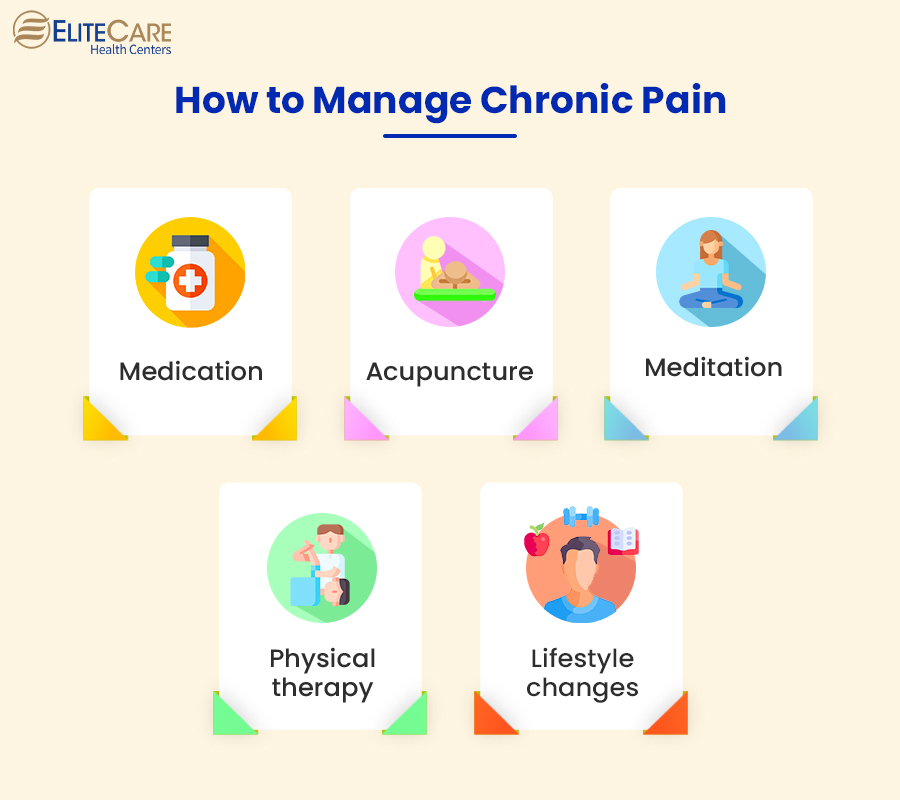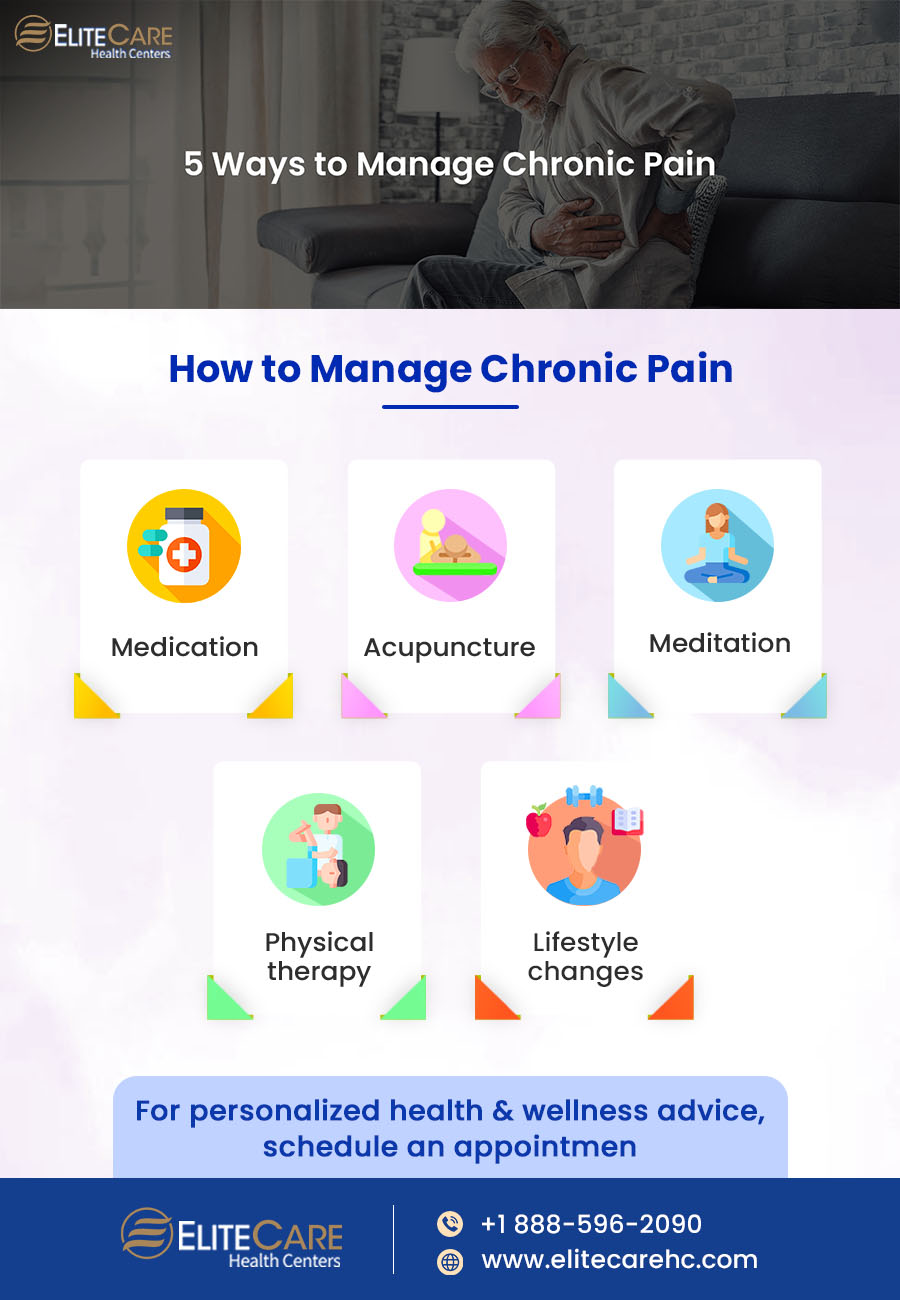
Chronic pain is a debilitating medical condition that affects millions of people. It is the leading cause of disability and disease worldwide. About 20.5% of adults in the United States suffer from chronic pain. It is the most common reason as to why people seek healthcare.
Chronic pain can be defined as any pain that persists for more than three to six months. It can significantly reduce a person’s quality of life, making it difficult for them to work, socialize, and engage in everyday activities. But despite its prevalence, it is often misunderstood and undertreated, leading many to suffer in silence. In this blog post, we will explore the causes and different conditions that cause chronic pain and provide effective ways to manage it better.
What Causes Chronic Pain?
Chronic pain can be caused by a variety of factors, including injury, inflammation, nerve damage, or pre-existing medical conditions. When pain persists for an extended period of time, it can lead to changes in the body and the brain. One of the key changes that occurs in the brain is known as “neuroplasticity,” which is the ability of the nervous system to adapt to changes in the environment or the body.
In the case of chronic pain, the nervous system may become “sensitized,” meaning that it becomes more sensitive to pain signals, even in response to normal stimuli. This can cause the brain to perceive pain more intensely, leading to a cycle of chronic pain.
In addition to sensitization, chronic pain can also cause changes in the brain’s anatomy and function. For example, studies have shown that chronic pain can lead to a reduction in gray matter volume in certain areas of the brain.
Which Health Conditions Cause Chronic Pain?
Some of the most common health conditions that are associated with chronic pain include the following:
Arthritis
Arthritis refers to the inflammation in one or more joints in the body. It is typically characterized by debilitating pain and stiffness. In the United States, it is estimated that 1 out of 4 adults suffer from chronic joint pain due to this disease. The most common types of this condition include osteoarthritis and rheumatoid arthritis.
Arthritis is often associated with chronic pain because inflammation in the joints can cause damage to the surrounding tissues and nerves. It can also change the structure and function of the joints over time, leading to poor mobility. As the joint pain intensifies, an individual might become less active. This cycle of inactivity and consequent muscle weakness can further exacerbate the pain and make it more challenging to manage.
Read More: A Complete Guide to Exercise to Relieve Arthritis Pain
Fibromyalgia
This disorder is characterized by widespread pain and tenderness in the muscles, joints, and soft tissues. The exact cause of fibromyalgia is not fully understood, but it is thought to be related to abnormalities in the way the brain processes pain signals. People with fibromyalgia often experience pain that lasts for months or years.
Unlike other forms of pain, fibromyalgia is not associated with inflammation or tissue damage, but rather a heightened sensitivity to pain signals in the nervous system. This means that people with this condition may experience pain in response to stimuli that would not normally be considered painful, such as light touch or changes in temperature.
Neuropathy
Neuropathy is a condition that occurs as a result of damage or dysfunction to the nerves. Neuropathic pain is often described as a burning, tingling, or stabbing sensation that can be persistent and debilitating. It can be caused by a variety of factors, including diabetes, infections, injuries, autoimmune disorders, and certain medications.
About 7-8 % of adults suffer from this condition in the United States. Despite its prevalence, neuropathic pain is often poorly managed. This can have a significant impact on a person’s physical and emotional well-being.
These are just a few examples of the many health conditions that can cause chronic pain. It’s important to consult a professional at the nearest health and wellness center if one experiences pain that persists for longer than 12 weeks in order to determine the underlying cause of it and develop an appropriate treatment plan.
How to Manage Chronic Pain?

There are several steps one can take to manage chronic pain better, these include:
Medication
Physicians may prescribe different types of medications that can help alleviate chronic pain, including nonsteroidal anti-inflammatory drugs, tricyclic antidepressants or painkillers.
Physical therapy
It can significantly improve mobility and flexibility. A physical therapist can help develop exercises tailored to an individual’s specific needs to strengthen their muscles, which can help reduce pain and increase their range of motion.
Mind-body techniques
Mind-body techniques such as meditation, relaxation, and deep breathing exercises can be powerful tools in managing chronic pain. These techniques focus on the connection between the mind and the body, as the mind has the power to influence physical sensations such as pain.
Acupuncture
Acupuncture stimulates the release of endorphins, which are the body’s natural painkillers. Endorphins help reduce the sensation of pain and provide long-lasting relief. Acupuncture can also stimulate the nervous system, which can help reduce pain by blocking pain signals from reaching the brain.
Lifestyle changes
Lifestyle changes such as getting regular exercise, eating a healthy diet, getting enough sleep, and reducing stress can all help to reduce chronic pain.
Management of chronic pain is a complex and ongoing process that involves a range of treatment options aimed at reducing pain and improving quality of life. Therefore, a multidisciplinary approach that combines several of these strategies may be most effective in managing it better. It is also important to work with a healthcare provider to develop a treatment plan that is uniquely tailored to suit one’s specific needs.
Conclusion
Managing chronic pain can be especially challenging as it can have a significant impact that extends far beyond physical discomfort. In addition to causing physical pain, it can also contribute to the development of mental health issues such as depression and anxiety. Despite the availability of treatment options, finding an effective approach to managing chronic pain can be quite difficult. Moreover, many prescription medications that are commonly used to treat it can result in adverse side effects. Navigating these challenges can be overwhelming, which is why it is essential to work closely with a healthcare provider to develop a personalized treatment plan that addresses all aspects of chronic pain management. With the right support and resources, individuals can find relief from pain and improve their quality of life.
If you or an elderly loved one is struggling with chronic pain, visit the nearest EliteCare clinic for personalized advice and preventative care services. EliteCare is one of Florida’s best medical clinics, with a team of highly trained primary care physicians who offer services like venipuncture, immunizations, EKG and more. Visit their website to schedule an appointment today.






